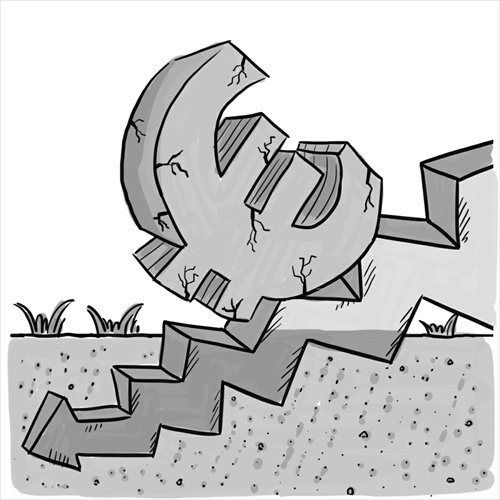HOME >> BUSINESS
Negative rates may fall short of lending target
By Dong Tongjian Source:Global Times Published: 2014-6-9 17:38:03

Illustration: Chen Xia/GT
Starting Wednesday, commercial banks within the eurozone will have to pay to park their money at the European Central Bank (ECB). According to announcements made Thursday, the central bank and monetary policy administrator for Europe's common currency will lower interest rates on deposits that exceed minimum requirements to below zero, a rare move designed to combat sluggish economic growth and dangerously low levels of inflation.
Specifically, deposit rates will be slashed 10 basis points to -0.1 percent. The main refinancing rate was also reduced by the same margin to 0.15 percent. With this move, the ECB clearly has its sights on two objects: weakening the stubbornly resilient euro and encouraging commercial banks to step up lending into the private sector.
The central bank's somewhat unusual action comes on the heels of a recent upswing in loan demand. Survey results released in April show net credit demand in all categories climbing back into positive territory following a prolonged period of contraction. Specifically, demand from enterprises increased by 2 percent year-on-year in the first quarter of 2014, up from the decline of 11 percent notched during the previous quarter and marking the first expansion in loan demand since the second quarter of 2011.
While the recovery in credit demand signals a renewed confidence in the economic prospects of the eurozone, it is unclear whether the ECB's latest policy move will encourage more companies to borrow or merely feed an existing appetite. There is also a possibility that banks could derail the ECB's decision by charging borrowers or supporting investments in non-eurozone areas.
Denmark, for instance, has had trouble inciting lending growth since it introduced negative interest rates back in July 2012. According to media reports and data release by the country's central bank, deposits and loan volumes in the country have consistently tracked lower over the past six quarters. On the currency front though, negative rates were largely successful in stabilizing the krone, a currency which many fled to during the euro crisis.
While Danish banks stopped short of charging deposits, other institutions did not hold back. The Bank of New York Mellon Corporation and State Street Corporation, two of the world's largest custodial banks, imposed negative rates on depositors holding the Danish krone.
Over the past several days, many have looked at Denmark's example for signs of where the ECB's move might lead. Actually, the ECB has gone a step further with the launch of targeted longer-term refinancing operations, a quantitative easing measure that will inject hundreds of billions of euros into the currency union's banking system.
As the ECB explained, this liquidity is meant to ensure ample funding support to the real economy by giving banks an easy dose of cash. While this specific measure reportedly took some by surprise, previous statements from the bank had ramped up expectations for some form of policy loosening. For the most part, market participants appear to have already priced in the arrival of such operations. This may be enough to trigger a slight weakening in the euro, although the dramatic impact that many now hope for may not come until the ECB goes ahead with its long-awaited broad-based asset purchasing program. But such a step could create several unintended consequences - overzealous pump priming, for example, might lead to an increase in investment into neighboring countries and regions, rather than companies within the eurozone.
The GDP of the eurozone grew by 0.2 percent year-on-year in the first quarter, signaling a somewhat weaker recovery than many expected. Depending on future economic conditions, banks may look for more lucrative (and speculative) opportunities in non-eurozone countries in Eastern Europe or other developing regions.
Some analysts predict that easing policies on the part of the ECB will push the US Federal Reserve to accelerate the unwinding of its own quantitative easing measures. After all, liquidity produced in Europe could just as easily flow into American assets. This outcome would surely benefit the US, but as steps to revive the eurozone progress, the ECB should make sure that its efforts hit their desired marks.
The author is a reporter with the Global Times. bizopinion@globaltimes.com.cn
Newspaper headline: Banks could take ECB efforts in unintended direction
Posted in: Comments